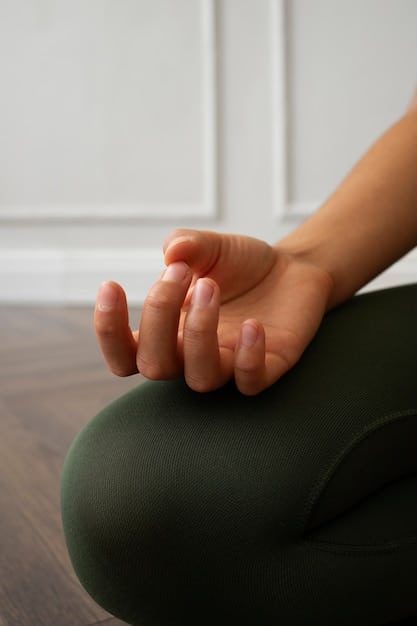Enhance Your Intuition: Meditation Guide for Inner Wisdom

Enhance your intuition through meditation, a practical guide offering techniques to develop inner wisdom, improve decision-making, and foster a deeper connection with your subconscious mind for personal growth.
Do you ever find yourself wishing you could tap into a deeper sense of knowing? Our intuition, that quiet inner voice, often holds valuable insights that can guide us through life’s complexities. One of the most effective ways to enhance your intuition with meditation is to make time for it. Taking a few minutes each day can open up your consciousness and connect you to your inner self.
Understanding Intuition and Its Importance
Intuition is often described as a “gut feeling” or an inner sense that guides us. But what exactly is it, and why is it so important? Understanding intuition involves recognizing it as a form of intelligence that operates beyond logical reasoning.
What is Intuition?
Intuition is the ability to understand something instinctively, without the need for conscious reasoning. It’s a form of knowledge that arises from our subconscious, drawing on past experiences, emotions, and stored information. It can manifest as a feeling, an image, or a sudden insight.
The Role of Intuition in Daily Life
Intuition plays a significant role in our daily lives, influencing our decisions and actions in subtle yet profound ways. It can help us navigate complex situations, make better choices, and avoid potential pitfalls.
- Decision-Making: Intuition can provide valuable insights when logical analysis is insufficient.
- Problem-Solving: It can offer creative solutions by tapping into subconscious knowledge.
- Relationship Building: Intuition helps us understand unspoken cues and connect with others on a deeper level.
- Personal Growth: By listening to our intuition, we can gain self-awareness and pursue a more authentic path.
By valuing and developing our intuition, we empower ourselves to live more fully and make choices that align with our true selves. Recognizing intuition as a valuable tool enhances our overall well-being and decision-making abilities.
The Connection Between Meditation and Intuition
Meditation and intuition are deeply intertwined. Meditation provides a pathway to quiet the mind, creating space for intuitive insights to surface. Understanding this connection is key to unlocking your inner wisdom. Meditation is a powerful tool that helps quiet the mind, reduce distractions, and create a state of inner peace which in turn strengthens intuition.
How Meditation Calms the Mind
Meditation calms the mind by reducing mental chatter and promoting relaxation. Regular practive slows does brainwave activity, allowing calm and focused state of mind which opens up the door for intuition.
Creating Space for Intuitive Insights
Meditation creates space for intuitive insights by minimizing distractions and increasing self-awareness. This mental clarity allows subtle intuitive signals to be recognized and understood. This focused attention enhances the ability to notice subtle cues and feelings which are often the source of intuition.
- Reduced Stress: Meditation reduces stress hormones like cortisol, promoting a clearer mental state.
- Enhanced Focus: It improves concentration, making it easier to tune into subtle signals.
- Increased Self-Awareness: Regular meditation fosters a deeper understanding of your thoughts and emotions.
- Improved Emotional Regulation: Meditation helps manage emotional responses, allowing for more objective intuition.
Meditative practice is a perfect setting for nurturing and acting intentionally on your intuition. By consistently practicing, you enhance your natural intuitive capabilities and learn to trust and rely upon the wisdom that emerges.

Preparing for Your Meditation Practice
Before diving into meditation, preparing your environment and mindset is essential. Just as a painter sets up their canvas and brushes, setting the stage for your meditation practice enhances its effectiveness.
Creating a Peaceful Environment
Choose a quiet space where you won’t be disturbed. Soft lighting, comfortable seating, and a calming atmosphere can significantly enhance your meditation experience. Reduce distractions and create a space that promotes relaxation and focus.
Setting Intentions for Your Meditation
Setting intentions helps focus your meditation and align it with your goals. Before you begin, take a moment to reflect on what you hope to achieve. Setting intentions provides a clear direction for your meditation. Write down or mentally state what you wish to achieve during your practice.
- Clarity: Seek clarity on a specific issue or decision.
- Guidance: Ask for guidance on your life path or personal growth.
- Connection: Intend to connect with your inner wisdom and intuition.
- Peace: Aim to cultivate inner peace and reduce stress.
Preparation is key to a successful meditative journey. By creating a peaceful environment and setting clear intentions, you lay the foundation for a deeper, more insightful meditation experience. These initial steps amplify the potential to unlock intuition and inner wisdom.
Guided Meditation Techniques to Enhance Intuition
Guided meditation is a powerful tool for enhancing intuition. These meditations often involve visualization and specific prompts designed to tap into your subconscious and intuitive abilities.
Visualization for Intuitive Guidance
Visualization techniques involve creating mental images to stimulate your intuition. Close your eyes and imagine yourself in a peaceful setting. Visualize yourself receiving guidance or clarity on a specific issue.
Affirmations for Intuition
Affirmations are positive statements that reinforce your intuitive abilities. Repeat affirmations such as “I trust my intuition” or “I am open to receiving intuitive guidance” to strengthen your belief in your inner wisdom.
This section offers sample scripts and explains how to create your own guides. You can personalize them to align with your needs and preferences. Here are some affirmations that will help you to develop your intuition.
- “I trust my intuition,”
- “I am open to receiving intuitive guidance,”
- “My intuition guides me clearly and accurately,”
- “I easily recognize and understand my intuitive insights.”
Guided meditation is a very effective way to tap into your intuition and receive intuitive guidance. You will be able to develop your intuition while being immersed in a relaxed situation with no distractions. When used regularly, this meditation technique will boost your ability to connect with that inner knowing as they move throughout their day.
Mindfulness Meditation for Intuition
Mindfulness meditation involves paying attention to the present moment without judgment. This practice can sharpen your awareness and help you notice subtle intuitive signals that might otherwise be missed.
Focusing on the Present Moment
Mindfulness meditation encourages you to focus on your breath, body sensations, and thoughts as they arise. This helps quiet the mind and increase your awareness of the present moment.
Observing Thoughts and Feelings Without Judgment
As you meditate, observe your thoughts and feelings without getting carried away by them. Simply acknowledge them and let them pass. This non-judgmental observation allows you to gain insights into your inner workings.

This approach also reduces the noise from the outer world that so often distracts from our own wisdom. Here are some benefits of practicing mindfulness to enhance your sense of intuition.
- Enhanced Sensory Awareness: Noticing details you might otherwise miss.
- Emotional Clarity: Gain insights into your feelings, especially underlying emotions, to help you make better-informed decisions.
- Less Reactive Behavior: By being present you can respond thoughtfully rather than reacting on impulse alone.
Mindfulness meditation is a way to enhance your intuition because it focuses attention and presence. Regular practice helps you to become acutely aware of thoughts, feelings, sensations and the whole environment surrounding you with more clarity and less judgment. This sharpens your sensitivity to both inner wisdom and outer situations, allowing you to make better instinctive decisions.
Integrating Intuition into Daily Life
Developing your intuition isn’t just about meditation; it’s also about integrating it into your daily life. By practicing intuitive decision-making and mindful observation, you can strengthen your intuitive abilities and make better choices.
Practicing Intuitive Decision-Making
Start by making small decisions based on your intuition. Pay attention to your gut feelings and inner guidance. Assess the outcomes and learn from your experiences. Trust your inner voice and let it guide you. Every time you follow your intuition, it helps strengthen it.
Tools for Developing Intuition
There are many tools to help you to improve and develop your intuition. There is no one size fits all approach. Below are some great tools to work with:
- Journaling.
- Dream Analysis.
- Oracle and Tarot Cards: Use these to help stimulate insight and reflection into daily thoughts, actions and choices.
Integrating intuition into daily life transforms the way you interact with the world. It will enable you to live authentically, align with your truest self, and create opportunities that resonate with your inner purpose.
| Key Point | Brief Description |
|---|---|
| 🧘♀️ Meditation Calms the Mind | Reduces mental noise, promoting relaxation and mental clarity. |
| ✨ Setting Intentions | Focuses your meditation and aligns it with your goals. |
| 🧘♂️ Guided Meditation | Uses visualization and positive affirmations to tap into subconscious wisdom. |
| 🤔 Mindful Observation | Increases awareness in the present moment, sharpening recognition of subtle cues. |
FAQ
▼
Intuition is a form of deeper understanding that feels like ‘knowing without knowing’. It differs from instinct, which is an immediate, biological response to a threat or need, by being more about insight and less about survival.
▼
Consistency is key. Aim for at least 15-20 minutes of meditation daily. Regular practice enhances your ability to quiet the mind and tap into intuitive insights over time.
▼
Yes, absolutely! Intuition is a natural human ability. Meditation can serve as a skill set to refine what has previously been dormant, available to anyone dedicated to practicing regularly.
▼
Intuition often feels like a quiet knowing or a deep sense of confidence that something is correct, even without logical proof. Over time, you’ll recognize its distinct nature and start to trust it!
▼
It’s normal for thoughts to arise during meditation. Acknowledge them without judgment and gently redirect your focus back to your breath or the meditation prompt. Practice makes perfect!
Conclusion
Enhancing your intuition with meditation is a journey of self-discovery and inner exploration. By incorporating these meditation techniques into your daily routine, you can unlock a deeper sense of knowing and make decisions that align with your true self. Embrace the process, trust your inner voice, and watch as your intuition guides you towards greater wisdom and fulfillment.





